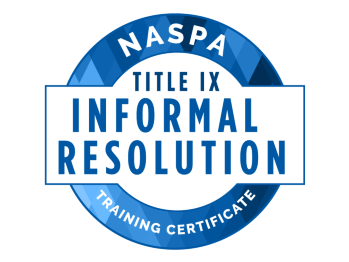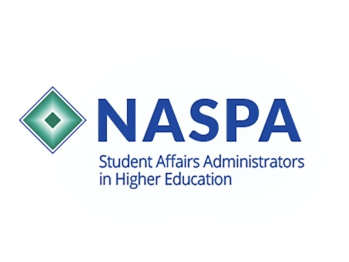
Informal Resolution Certificate Program
Virtual Short Courses
November 12 - November 14, 2020 Virtual
In May 2020, the U.S. Department of Education released new Title IX regulations with extensive comments. Institutions are required to adopt new formal grievance processes but now have the choice to implement a variety of informal resolution processes for Title IX matters under certain conditions. Campuses are already implementing a wide-variety of informal processes—many include elements of restorative justice and mediation—but institutions must provide proper training to use informal systems in Title IX matters.
How should campuses go about utilizing processes for informal resolution in the new Title IX regime? Who should deliver informal resolution options and what skills do these personnel need? What options do institutions have to deliver informal resolution? What are the potential benefits and challenges with different forms of informal resolution? What are the promising practices, and practices to avoid? Will informal resolution become dominated by lawyers or certified professionals with extensive training?
Join higher education law and policy expert (and past-professor of alternative dispute resolution) Peter Lake and Kristine Goodwin J.D., a former higher education administrator and trained mediator, to explore these and other issues. This 8-hour training includes three asynchronous video modules and one 4-hour live synchronous session where participants will participate in informal resolution practice sessions with realistic scenarios to develop core informal resolution skills.
PLEASE NOTE:
Video modules must be viewed in sequence and attendees must demonstrate competency on each module's assessment before moving onto the next module. All three videos must be viewed before the live session. There are two options to attend the live session, and attendees must choose one, and only one, date to attend. Attendance at the live session is mandatory to receive the certificate. Due to the interactive nature of the live sessions, these sessions will not be recorded.
Purchasing this Informal Resolution training provides limited access to pre-recorded videos and live sessions in addition to training materials - PowerPoint slides and handouts, if any. Training participants shall ask, and NASPA will grant, permission to post the copyrighted materials - PowerPoint slides and handouts, if any - to their institution's website in accordance with 34 C.F.R. § 106.45(b)(10)(i)(D).
Presented By

About
With the final Title IX regulations from the Department of Education implementation deadline of August 14, the push has been on for student affairs administrators from across campus to come together to determine how their institutions will meet the requirements of the new rule. A key piece of compliance comes in the form of training - for anyone who the institution designates as being responsible for conducting any informal resolution process. NASPA has partnered with Peter Lake and other experts in higher education to develop a comprehensive training tailored to any professional who has been charged with implementing informal resolutions processes. This new training program is a one-of-a-kind, hybrid online and synchronous learning experience designed to assist administrators in getting up to speed on informal resolution procedures, especially within the confines of the new Title IX rules.
Learning Outcomes
After attending this training, participants will be provided with a certificate, indicating that they have demonstrated the following:
- Understanding the new requirements within the Title IX regulations issued by the Department of Education, specific to informal resolutions processes
- Identifying the types of informal resolution procedures allowable under the Title IX regulations
- Composing policies, practices, and procedures for informal resolutions that comply with the regulations
Informal Resolution Topics
This training is designed for any higher education professionals who will be responsible for conducting any type of informal resolution process related to sexual misconduct, dating/domestic violence or stalking conduct violations on campus. This training covers the requirements under the new regulations for informal resolution proceedings; an overview of informal resolution options; and the development of policies, procedures, and practices for informal resolutions that are compliant with the new regulations.
Duration: 8 hours
Audience: Title IX Coordinators, Title IX staff, conduct staff or other higher education professionals charged with informal resolutions processes
Format: Video Modules and Live Sessions
See below for details on modules and live virtual sessions dates and times.
Recorded Sessions
Introduction and Overview (1 hour)
Topics Include:
- What are the regulatory requirements regarding “informal resolution” under Title IX?
- What types of informal resolution exist? What are the range of options available to institutions?
- Who can implement informal resolutions on your campus?
- When is it inappropriate to use informal resolution processes?
- Who are “impacted Individuals” under Title IX?
- How do informal processes support culture and climate work on campus?
- How do informal processes relate to other, more formalized processes such as bias and incident response processes?
- What type of training and skills do informal resolution tasked personnel need?
- Title IX’s definition of “sexual harassment”
- Scope of the school’s education program or activity
- How to serve impartially, including by avoiding prejudgment of the facts at issue
- How to avoid conflicts of interest and bias
- Desirable skills and knowledge bases
- Potentially certified skills or skills that involve extensive additional training
- Budget impacts/size and nature of an institution
- Intersections with Advisors, Investigators and Decision-makers
- Cross-training
- Lessons learning from analogous fields
Developing Informal Processes for Your Campus (1 hour video)
A Closer Look at Specific Ways to Facilitate Effective Informal Resolutions
- Educational Conferences
- Mediation (Neutral, Facilitative, Collaborative)
- Med-Arb (Mediation and Arbitration, Non-Binding Arbitration)
- Restorative Justice
Developing and Planning an Informal Process
- How will you identify your process(es)?
- What are the goals and desirable outcomes associated with your informal process(es)?
- What forms will you choose?
- Who will facilitate the development of new or existing informal process(es)?
- Who will participate in informal process?
- What will you handle in-house and what might, or benefit from, the assistance of external assistance?
- What legal considerations exist?
Foundational Basics for Facilitating Resolutions (2 hour video)
- Preparation
- Understanding the Conflict(s)
- Defining Points of Agreement and Dispute
- Identifying Objective Standards and Interests
- Creating Options
- Developing a Resolution, including an Agreement
- “Break downs”—when informal resolution fails to reach resolution
- Re-entering Formal Process
- Managing “New” Information—warnings and other related issues
- Confidentiality Issues
- Monitoring Informal Resolutions/Planning for Potential Issues Post-Resolution
- Managing No-Contact Orders/Agreements
- Case Management Functions, if any
- Options for Self-help, Reporting and/or Enforcement
- Returning to Informal Resolution
Live Virtual Sessions
Live Virtual Sessions (4 hours)
Participants MUST view all of the recorded sessions prior to attending the live virtual session. Each participant MUST sign up for one of the live virtual sessions listed below. Information on how to sign up for the live session will be e-mailed to participants in the week before the live session dates occur. Live sessions are mandatory in order to complete the certificate and will not be recorded, as attendance at a live session is mandatory to complete the certificate.
- Quick review of the concepts in the video module
- Case studies/tabletop exercises in small groups
- Practice Techniques: Mediation (Neutral, Facilitative, Collaborative); Restorative Justice Session; Educational Conferences; Med-Arb (Mediation and Arbitration)
- Q&A with participants
Live session dates (must choose one):
- Live session #1 - Thursday, November 12 from 1:00 – 5:00 pm ET
- Live session #2 - Saturday, November 14 from 1:00 – 5:00 pm ET
Registration
Register here for Informal Resolution Certificate. The recorded modules for the informal resolution certificate program will be available online beginning October 26, 2020.
Discounts Available
Team Discount:
Register four, or more, individuals from the same institution, and receive a 20% discount off the total registration amount! Registrants must be currently employed at the same institution. Discount may ony apply at the time of a group registration, and is not retroactive. The discount rate is applied to the individual member/non-member rate (registration rates are based on individual, not institutional, memberships). For assistance in accessing this discount, please contact Jill Dunlap, Senior Director of Research, Policy, and Civic Engagement with the names and titles of all registrants to be included in the discounted team registration. The registration deadline is November 6, 2020.
Title IX Certificate Participant Discount:
Anyone who wishes to register for the Informal Resolutions certificate, who has successfully completed any of the three tracks within the Title IX Certificate program are eligible for a 10% discount for this certificate program. For assistance in accessing this discount, please contact Jill Dunlap, Senior Director of Research, Policy, and Civic Engagement with the names and titles of all registrants to be included in the discounted team registration. The registration deadline is November 6, 2020.
NASPA individual members and Voting Delegates have access to member pricing for all NASPA events. If you are not a NASPA individual member, please visit our membership section to learn more about membership types and benefits. In many cases, an annual NASPA membership plus the event member registration fee are still less than the event non-member registration fee. We hope you’ll consider joining today!
Registration Fees | |
|---|---|
| Informal Resolution Certificate | |
| NASPA Member: $549 | Non-Member: $749 |
Policies and Contact Information
Contact Information
Registration Issues/Questions:NASPA Main Office - (202) 265-7500
|
Program Questions/General Information:Jill Dunlap - (202) 719-1196
|
Payment Policies
To view NASPA's complete payment policies and procedures, click here.
Captioning Assistance
Text Captioning Support: NASPA kindly requests five business days notice for captioning requests. You can request captioning within the online registration process. If your registration is received within the five business days prior to the live event, you will be contacted by NASPA staff.

